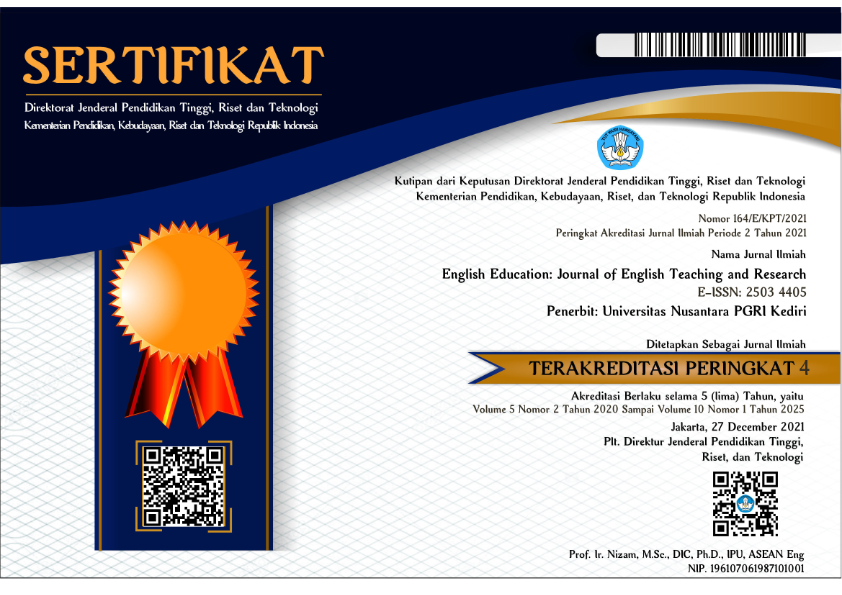THE IMPLEMENTATION OF METACOGNITIVE STRATEGY TRAINING TO ENHANCE EFL STUDENTS ORAL PRESENTATION SKILL
DOI:
https://doi.org/10.29407/jetar.v5i1.14324Keywords:
Implementation, metacognitive strategy training, oral presentation skillAbstract
Doing oral presentation has been a common classroom activity for university students including EFL students for almost any subject they are taking, but the writer found that students still had problems with their presentation and could not do their presentation effectively. In order to do the task successfully, students need metacognitive skill because they need to think about the task, plan for the task, monitor the task, and evaluate how well they have done the task. To reach this purpose, teachers need to facilitate the process through strategy instruction, especially metacognitive strategy instruction. By applying metacognitive strategies, students will be more aware of the importance of their active role in their learning. This paper is intended to present metacognitive strategy instruction adopting Oxford’ metacognitive strategies to enhance EFL students’ oral presentation skill in their speaking class and the students’ responses toward the strategy instruction. Based on the analysis of the students’ performance, video recording, teacher evaluation, self evaluation, peer evaluation, and written reflection, they have done their oral presentation better, and they had positive responses toward metacognitive instruction and became more aware of themselves as learners who are responsible for their success.
Keywords: EFL students, Oral presentation skill, metacognitive strategy training
Downloads
References
Adam, K. (2004). Modelling success: Enhancing international postgraduate research students’ self-efficacy for research seminar presentations, Higher Education research and Development. 23(20), pp. 115-130.
Al-Nouh, Nowreyah A., Abdul-Karim, Munerra M., and Taqi, Hanan A. (2015).EFL college students’ perceptions of the difficulties in oral presentation as a form of assessment.International Journal of Higher Education. 4(1), 136-150. http://dx.doi.org/10.5430/ijhe.v4n1p136
Anderson, N. J. (2008). Metacognition and good language learners. In Carol, Griffiths (Ed.), Lesson from good language learners.pp. 99-120. Cambridge: Cambridge University Press.
Cohen, A. D. (1998). Strategies in learning and using a second language. Essex, England; Longman.
Chamot, A. U. (2008) Strategy instruction and good language learners. In Carol, Griffiths (Ed.), Lesson from good language learners. (pp. 266-281). Cambridge: Cambridge University Press.
Erkaya, Odilea Rocha. (2011). Teaching oral presentation skills to college EFL students. Humanising language teaching journal,13(1). Retrieved from http://www.hltmag.co.uk/feb11/sart06.htm.
Farzam, M. (2018).The effect of cognitive and metacognitive strategy training on intermediate Iranian EFL learners’ willingness to communicate. International Journal of Applied Linguistics and English Literature, 7(1), 193-202.
http://dx.doi.org/10.7575/aiac.ijalel.v.7n.1p.193
King, J. (2002). Preparing EFL learners for oral presentations. The Internet TESL Journal, 8(3). In http://itseslj.org/ Retrieved from http://itesllj.org/Lessons/King-PublicSpeaking.html
Lam, Wendy Y. K. (2010) metacognitive Strategy Teaching in The ESL Oral Classroom. Australian Review of Applied Linguistics, 33(1).
Magaldi, Lucia Garcia. (2010). Metacognitive based instruction to support learner autonomy in language learning. Revista Canaria De Estudios Ingleses, 61, 73-86.
Mazdayana, Golnar. (2012). Objective assessment of oral presentations and EFL Learners’ speaking development. Sheikhbahase EFL Journal, 1(1), 23-37.
Morita, N (2000). Discourse socialization through oral presentation activities in a TESL graduate program. TESOL Quarterly 34(2), pp. 279-310.
Nakatani, Y. (2005). The effect of awareness-raising training on oral communication strategy use. The Modern Language Journal, 99(1),176-192.
O’Malley, J.M., & Chamot, A. U. (1990). Learning strategies in second language acquisition. Cambridge: Cambridge University Press.
Oxford, R. L. (1990). Language learning strategies: What every teacher should know. New York: Newbury House.
Oxford, R.L. (2011). Teaching and researching language learning strategies. London: Pearson Education Limited.
Rao, P. S. (2019). The importance of speaking skills in English classrooms.Alford Council of International English & Literature Journal (ACIELJ), 2(2), 6-18.
Rashtchi, M., Khani, P. (2010).Improving EFL learner’s oral proficiency through metacognitive strategy instruction. JELS, 1(4), 137-156.
Savignon, Sandra J. (2001). Communicative Language Teaching for the Twenty-First Century. In Murcia Celce Marianne (Ed.), (pp. 13-28) Teaching English as a second or foreign language. Oxford: Oxford University Press.
Yamkate K. & Intratat, C. (2012). Using video recordings to facilitate student development of oral presentation skill. Language Education in Asia, 3(2), pp. 146-158.
Wenden, A. (1991). Learner strategies for learner autonomy. New York; Prentice-Hall International.
Downloads
Published
Issue
Section
License
Authors who publish with this journal agree to the following terms:
- Copyright on any article is retained by the author(s).
- The author grants the journal, the right of first publication with the work simultaneously licensed under a Creative Commons Attribution License that allows others to share the work with an acknowledgment of the work’s authorship and initial publication in this journal.
- Authors are able to enter into separate, additional contractual arrangements for the non-exclusive distribution of the journal’s published version of the work (e.g., post it to an institutional repository or publish it in a book), with an acknowledgment of its initial publication in this journal.
- Authors are permitted and encouraged to post their work online (e.g., in institutional repositories or on their website) prior to and during the submission process, as it can lead to productive exchanges, as well as earlier and greater citation of published work.
- The article and any associated published material is distributed under the Creative Commons Attribution-ShareAlike 4.0 International License








 Article template
Article template



